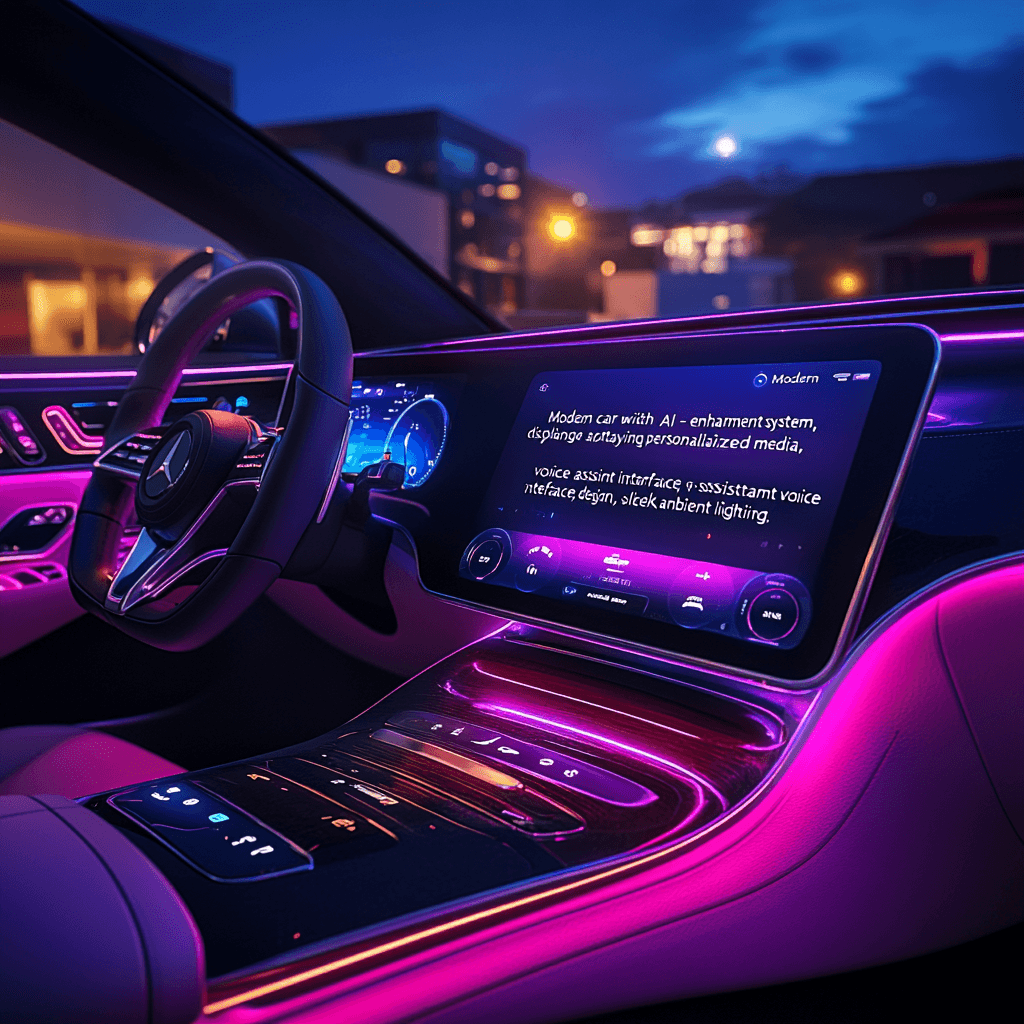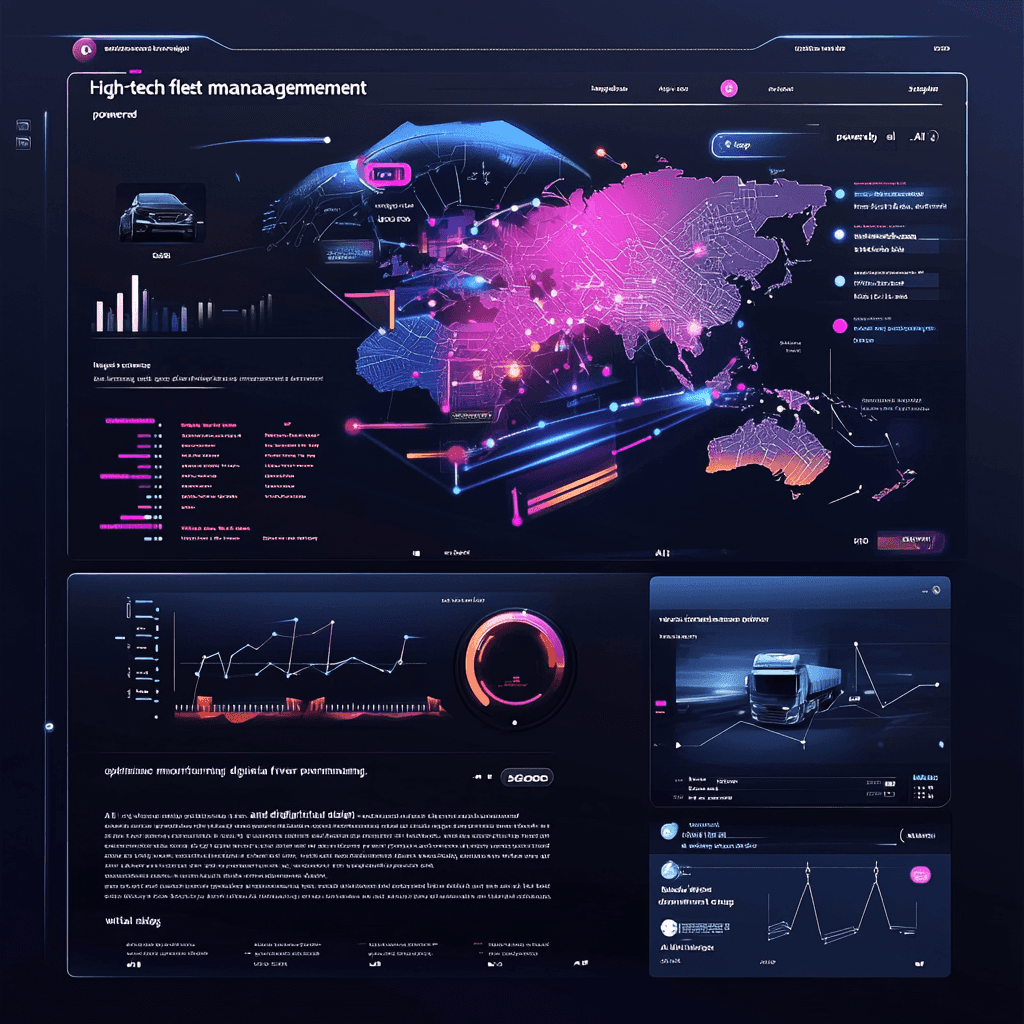
AI in Vehicle Performance Optimization

AI in Automotive Manufacturing Processes

AI in Autonomous Driving and Navigation

AI-Enhanced In-Vehicle Infotainment

AI for Fleet Management and Logistics

Conclusion

FAQ
April 15, 2025

5 minutes minutes to read
Artificial Intelligence (AI) is rapidly becoming the cornerstone of innovation in the automotive industry. From boosting vehicle performance and streamlining manufacturing to enabling autonomous driving and enhancing in-vehicle infotainment, AI is transforming how cars are built, operated, and experienced. For businesses working with custom software development companies, AI presents a powerful opportunity to deliver cutting-edge, intelligent automotive solutions tailored to the evolving needs of manufacturers, fleet operators, and consumers.
As vehicles become increasingly connected and data-driven, the demand for software that can interpret, learn, and act in real time is growing. AI enables smarter decision-making, predictive insights, and adaptive user experiences that set modern vehicles apart. This article explores how AI is driving advancements across four key areas—vehicle performance optimization, manufacturing processes, autonomous navigation, and infotainment—and how custom software plays a crucial role in making these innovations a reality.

Artificial Intelligence (AI) is transforming vehicle performance optimization, offering custom software development companies a powerful opportunity to deliver smarter, data-driven automotive solutions. By analyzing real-time data from sensors and control units, AI enables predictive maintenance, performance tuning, and adaptive driving features that significantly enhance efficiency and safety.
AI algorithms can detect potential mechanical issues before they become costly failures, reducing downtime and improving reliability. In fleet management, this translates to lower operating costs and better asset utilization. AI also helps fine-tune engine settings, fuel consumption, and even driving styles based on road and weather conditions, ensuring optimal performance under all circumstances.
For companies developing automotive software, integrating AI adds substantial value—creating intelligent systems that learn, adapt, and improve over time. It’s not just about building software; it’s about shaping the future of mobility through innovation and efficiency.
| Feature | AI Contribution | Real-World Impact |
| Adaptive Cruise Control |
|
|
| Predictive Maintenance |
|
|
| Fuel Efficiency Optimization |
|
|

AI is revolutionizing automotive manufacturing by streamlining operations, improving quality, and reducing costs. For businesses working with custom software development companies, this presents a strategic opportunity to build AI-driven solutions that enhance production efficiency and innovation.
From robotic process automation to intelligent quality control, AI enables real-time monitoring, predictive maintenance, and defect detection. Machine learning models can analyze data from sensors and machinery to optimize workflows, minimize downtime, and reduce material waste. Vision systems powered by AI detect even the smallest imperfections, ensuring consistent product quality.
Custom software solutions that integrate AI can empower manufacturers to make data-backed decisions, adapt to shifting demand, and maintain a competitive edge. Whether optimizing supply chains, automating assembly lines, or predicting equipment failures, AI is at the heart of the next industrial revolution—driven by smart, scalable software.
| Process | AI Integration | Benefit |
| Quality Control |
|
|
| Assembly Line Optimization |
|
|
| Inventory Forecasting |
|
|

AI is the driving force behind autonomous vehicles and intelligent navigation systems, offering immense potential for companies developing custom automotive software. By processing data from cameras, LiDAR, radar, and GPS in real time, AI enables vehicles to understand their surroundings, make decisions, and navigate safely without human intervention.
Machine learning models help autonomous systems recognize objects, predict the movement of pedestrians and other vehicles, and plan optimal routes. AI also adapts to changing road conditions, traffic patterns, and user preferences—delivering smarter, safer driving experiences.
For clients working with custom software development companies, integrating AI into autonomous driving solutions means unlocking new possibilities in safety, efficiency, and innovation. From self-driving cars to advanced driver-assistance systems (ADAS), AI-powered navigation is shaping the future of mobility—and software is at the core of making it real.
| Component | AI Role | Outcome |
| Sensor Fusion |
|
|
| Route Planning |
|
|
| Obstacle Avoidance |
|
|

AI is transforming in-vehicle infotainment systems, turning cars into intelligent, personalized digital hubs. For clients working with custom software development companies, this opens the door to creating immersive user experiences that adapt in real time.
AI enhances infotainment by learning driver preferences, offering personalized content suggestions, voice-controlled navigation, and intelligent assistant features. It can automatically adjust music, climate settings, and even suggest destinations based on behavior patterns or calendar data.
Natural language processing enables seamless voice interactions, while AI-driven user interfaces respond dynamically to context—minimizing distractions and enhancing safety. Integrated with cloud services and mobile ecosystems, these smart systems deliver continuous connectivity and convenience.
By developing AI-enhanced infotainment platforms, businesses can offer next-generation user experiences that set vehicles apart in a competitive market—driven by innovation, customization, and software intelligence.
| Feature | AI Functionality | User Benefit |
| Voice Assistants |
|
|
| Predictive Media Suggestions |
|
|
| Smart Climate Control |
|
|

AI is transforming in-vehicle infotainment systems, turning cars into intelligent, personalized digital hubs. For clients working with custom software development companies, this opens the door to creating immersive user experiences that adapt in real time.
AI enhances infotainment by learning driver preferences, offering personalized content suggestions, voice-controlled navigation, and intelligent assistant features. It can automatically adjust music, climate settings, and even suggest destinations based on behavior patterns or calendar data.
Natural language processing enables seamless voice interactions, while AI-driven user interfaces respond dynamically to context—minimizing distractions and enhancing safety. Integrated with cloud services and mobile ecosystems, these smart systems deliver continuous connectivity and convenience.
By developing AI-enhanced infotainment platforms, businesses can offer next-generation user experiences that set vehicles apart in a competitive market—driven by innovation, customization, and software intelligence.
| Task | AI Utility | Efficiency Gain |
| Route Optimization |
|
|
| Driver Behavior Monitoring |
|
|
| Maintenance Scheduling |
|
|
AI is redefining the future of the automotive industry across all key areas—from performance optimization and manufacturing to autonomous driving and in-vehicle infotainment. For businesses partnering with custom software development companies, this technological shift offers unprecedented opportunities to build smarter, more efficient, and highly personalized solutions.
By integrating AI into automotive systems, companies can deliver enhanced safety, productivity, and user satisfaction. Whether it’s optimizing engine performance, streamlining factory operations, enabling self-driving capabilities, or creating intelligent infotainment experiences, AI-powered software is the foundation of innovation.
As the automotive landscape continues to evolve, investing in AI-driven development is not just a competitive advantage—it’s a necessity. Custom software tailored to leverage AI will shape the next generation of vehicles, delivering value not only to end-users but to the entire mobility ecosystem.
AI is driving monumental changes across every corner of the automotive industry. From vehicle performance to logistics and user interfaces, integrating AI is no longer optional — it’s essential for survival and growth. As a leading mobile app development company or web development agency, partnering with AI experts like WTT Solutions ensures you’re not just keeping up but staying ahead.
How is AI used in automotive software development?
Can AI improve driver safety?
What role do mobile app development companies play?
Why should web development agencies care about automotive AI?
What’s the future of AI in cars?

LOOKING OFFSHORE SOFTWARE DEVELOPMENT?
We are ready to help! Get consulted with our specialists at no charge.


Your subscription is confirmed.
Thank you for being with us.